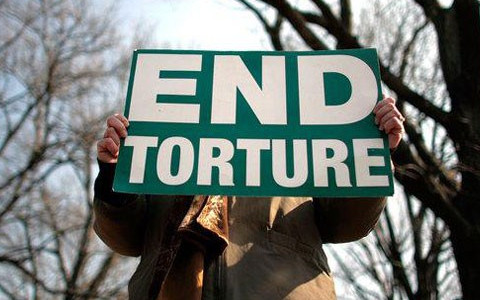26 June 2018 – Today, Americans for Democracy & Human Rights in Bahrain (ADHRB) commemorates the International Day in Support of Victims of Torture, calling on all countries to end the use of torture against their citizens. Furthermore, ADHRB is especially concerned with the continued systematic use of torture in Bahrain and Saudi Arabia, along with the culture of impunity that exists for perpetrators of these crimes.
Bahrain has an extensive history of using torture against human rights defenders, political opposition members, religious figures, and journalists. Particularly since the 2011 pro-democracy uprising in Bahrain, ADHRB has documented consistent cases of torture and extrajudicial killings at the hands of officials, including members of the royal family. Despite promises by the government to investigate, reform has only been superficial, and impunity for crimes of torture is common. Bahrain has also repeatedly refused requests by the Special Rapporteur on Torture to visit the Kingdom. The use of torture against those who have been detained in Bahrain violates Bahrain’s own laws, as well as its obligations as a state party to international treaties like the Convention against Torture (CAT).
The Bahraini government regularly uses torture as a tool of reprisal against human rights defenders and activists who speak out against the government and call for reform. Among those who have been victims of the Bahraini government’s use of systematic torture is human rights defender Abdulhadi al-Khawaja, who was violently arrested and charged in connection with his peaceful human rights activities. His arrest was followed by brutal torture resulting in a broken jaw, which needed several operations to repair. Similarly, Dr. Abduljalil al-Singace, a human rights defender who suffers from post-polio syndrome and is disabled, has faced torture by the Bahraini government. Officers beat and sexually assaulted Dr. al-Singace during his detainment. In 2011, the Bahrain Independent Commission of Inquiry (BICI) met with Dr. al-Singace and collected testimony about his arbitrary arrest and torture. Despite Dr. al-Singace’s credible allegations of abuse, in 2012 a civilian appeals court refused to further investigate his case. Additionally, Ebtisam al-Saegh, a prominent woman human rights defender who works to document human right violations on the ground in Bahrain, was tortured by Bahrain’s National Security Agency (NSA) in reprisal for her activism in 2017. She was blindfolded and, over the course of the next seven hours, subjected to physical and psychological torture by the Bahraini security forces. According to al-Saegh, she was beaten on her nose and stomach in particular, with knowledge that she had undergone nasal surgery and suffered from a colon condition. Bahraini authorities proceeded to sexually assault al-Saegh, threaten to rape her daughter, and tell her they would torture and electrocute her husband. The Bahraini government’s treatment of al-Saegh, al-Khawaja, and Dr. al-Singace is emblematic of its broader suppression of human rights defenders and civil and political society.
The Government of Saudi Arabia, much like Bahrain, also practices widespread and systematic torture in its prisons and detention centers despite its ratification of the Convention against Torture (CAT) in September 1997. Saudi Arabia’s counter-terror court system regularly accepts confessions obtained under torture as a valid form of evidence in trials. Judges in counter-terror courts frequently use defendants’ “confessions” to sentence them to lengthy prison terms or capital punishment, even when prisoners state before the court that officials tortured them into signing a false confession.
Activists and members of the Saudi kingdom’s Shia minority community who are arrested for their dissident views and participation in peaceful protests are at particular risk of abuse and torture. For example, Saudi officials tortured Ali al-Nimr, Dawood al-Marhoon, and Abdullah al-Zaher until they signed false confessions. The prosecution, in turn, used these false confessions as evidence to obtain a death sentence against them, despite their statements before the judge that they had been tortured into signing them. Other Shia activists face long-term, if not permanent, injuries due to severe torture. These activists include Ali al-Ribh and Mohammed al-Shioukh, who were executed on 2 January 2016, and Munir al-Adam and Fadel al-Labad who are at imminent risk of execution. Before they were executed, al-Ribh suffered long-term injuries including back pains, headaches, and weight loss, while al-Shioukh suffered heart damage, weakened eyesight, and complications from a broken jaw. Munir al-Adam is permanently deaf in one ear resulting from his torture, and Fadel al-Labad suffers from chronic back pain.
“The international community must come together to combat and end the systematic use of torture against civil and political society, particularly in Bahrain and Saudi Arabia. It is completely unacceptable for governments to use torture as a way to silence opposition,” says Husain Abdulla, ADHRB’s Executive Director. “The use of torture is a human rights violation that cannot be taken lightly. Those involved must be punished to the full extent of the law and the victims of these heinous crimes must be compensated for the abuse they have endured. Cases of torture which have been brought into the public eye are but a mere glimpse into the lack of accountability on behalf of the Bahraini and Saudi governments. The Bahraini and Saudi governments must stop their use of torture immediately.”
Despite promises by the Bahraini and Saudi governments to investigate claims of torture and end impunity, such abuses continue to this day. Furthermore these governments have continually endorsed these crimes by failing to punish the perpetrators. On the International Day in Support of Victims of Torture, ADHRB calls on the Bahraini and Saudi government and all countries to end their use of systematic torture against detainees including human rights defenders, political opposition, religious figures, and journalists.





